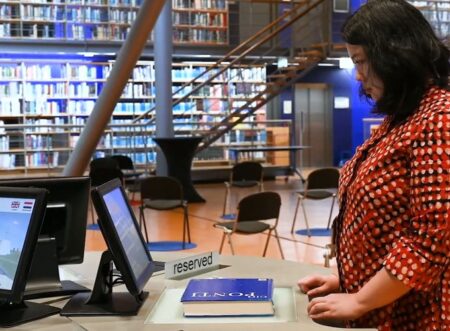Recommender Requirements for Pluriform Perspectives in Local Public Libraries
Sep 2020 - ongoing

In our increasingly digital information society, the role of the local public library is changing. While it may not be the primary source for knowledge anymore, it still is a valued, accessible social gathering space for demographically and socio-culturally diverse local communities. It also still is a place where people can encounter new literature in physical and digital form.
Public libraries do not have a commercial mission. As such, they can afford confronting citizens with a more pluriform and polyvocal set of perspectives, opinions and expressions than naturally would be encountered on their own. Being confronted with such contrasting perspectives may not necessarily be pleasant. However, as libraries are not as strongly driven by short-time engagement optimization as their commercial counterparts, and as they offer trustable, relatable and local in-person support, they may be able to get citizens out of their comfort zones in more nuanced and tolerable ways than would be possible through commercial online services.
Several public libraries are interested in novel recommender systems technologies, that can offer pluriform and contrasting perspectives to users, and offer society a more diverse and inclusive information environment. Such recommenders are delicate to build. Before doing this, it is important to get clear what users would naturally be (un)willing to see, and to concretize what diversity and inclusion would mean in the context of library collection curation and personalized filtering, and within the ultimate technical framework of a recommender system.
Capitalizing on recently centralized and digitized data on library collections, consumers and loan records, in this project, we will therefore seek to understand past and current consumer behavior (which has not yet been affected by digital recommenders), and use this understanding to engage with local professionals and citizens, to jointly establish requirements and success criteria for the desired future library recommenders.
The project will run as a 24-month research and co-creation project. We will address two main research questions with corresponding sub-questions:
- Public libraries believe their collections have a pluriform offer, catering to different interests and viewpoints. But how pluriform are these collections in reality?
-
- What indicators of diversity can be offered from existing collection catalogues, and what indicators may be missing?
-
- Considering existing loan records, how pluriform is current consumer behavior in reality?
-
- What portion of a physical library collection is actively taken home?
- How segregated are observed preference clusters?
-
For this, we will consider at least one full year of loan records, for a diverse, but representative sample of libraries. These should include libraries from both urbanized and rural regions across the country, also representing various local socio-economical environments. Where available, our analysis will also include loan behavior in different library branches within the same city.
By employing unsupervised machine learning techniques, we will seek to what extent consumer behavior can be clustered according to region and anonymized demographics. Next to this, we will particularly zoom in on preferences in two different segments: youth (benefiting from free library subscriptions) vs. adults (paid subscribers).
Following the data-driven insights, we will collaborate with designers to visualize our results in accessible and attractive ways. The visualizations will be donated back to the local libraries they originated from, and used as discussion starters, engaging professionals and citizens. In co-creation workshops, we will work with these parties to jointly establish requirements for the desired future recommender technology.
This project has been granted funding by the NWO science agenda, under the National Science Agenda’s ‘Idea Generator’ call. It will be conducted in the context of the Future Libraries Lab at TU Delft.